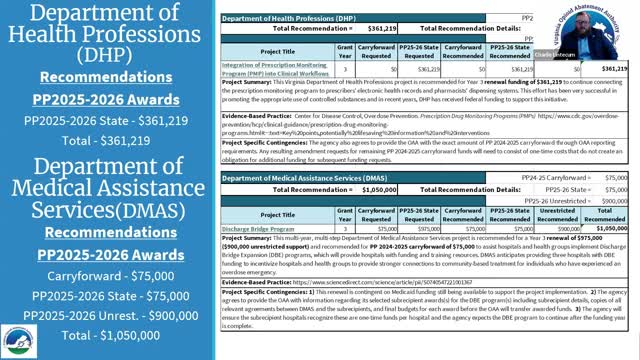Virginia Programs Secure $900K for Substance Use Disorder and Kinship Care Initiatives
August 02, 2025 | Opioid Abatement Authority, Boards and Commissions, Executive, Virginia
This article was created by AI summarizing key points discussed. AI makes mistakes, so for full details and context, please refer to the video of the full meeting. Please report any errors so we can fix them. Report an error »

A significant funding initiative aimed at enhancing opioid recovery efforts was unveiled during the Virginia Opioid Abatement Authority's Grants Committee Meeting on August 1, 2025. The committee recommended a $900,000 allocation to support hospitals in establishing bridge programs that connect patients discharged from emergency rooms to ongoing care and recovery services. This initiative is designed to facilitate "warm handoffs," where healthcare providers directly link patients to support systems, maximizing the critical moments when patients are most receptive to help.
The funding will provide one-time grants of approximately $300,000 each to three hospitals, enabling them to build capacity for these essential programs. The expectation is that once established, these programs will sustain themselves, ensuring long-term support for individuals recovering from substance use disorders.
In addition to hospital support, the meeting highlighted the renewal of the kinship care navigators project, which assists relatives caring for children separated from their parents due to substance use issues. This program aims to provide concrete support to kinship caregivers, significantly improving outcomes for children in these situations.
The committee also discussed the integration of an opioid reduction registry into Virginia's 2-1-1 information service, ensuring that individuals seeking help have access to the most current resources available. Furthermore, George Mason University proposed a pilot project aimed at expanding access to medication for opioid use disorder, with a request for $200,000 to develop regional partnerships.
The Office of the Attorney General is set to continue its impactful fentanyl prevention campaign, requesting $500,000 to further its outreach efforts, including educational programs targeting high school and college athletes.
These initiatives reflect a comprehensive approach to addressing the opioid crisis in Virginia, focusing on immediate support for individuals in need and long-term strategies for recovery and prevention. The anticipated outcomes from these projects could significantly enhance the state's capacity to combat substance use disorders and improve community health.
The funding will provide one-time grants of approximately $300,000 each to three hospitals, enabling them to build capacity for these essential programs. The expectation is that once established, these programs will sustain themselves, ensuring long-term support for individuals recovering from substance use disorders.
In addition to hospital support, the meeting highlighted the renewal of the kinship care navigators project, which assists relatives caring for children separated from their parents due to substance use issues. This program aims to provide concrete support to kinship caregivers, significantly improving outcomes for children in these situations.
The committee also discussed the integration of an opioid reduction registry into Virginia's 2-1-1 information service, ensuring that individuals seeking help have access to the most current resources available. Furthermore, George Mason University proposed a pilot project aimed at expanding access to medication for opioid use disorder, with a request for $200,000 to develop regional partnerships.
The Office of the Attorney General is set to continue its impactful fentanyl prevention campaign, requesting $500,000 to further its outreach efforts, including educational programs targeting high school and college athletes.
These initiatives reflect a comprehensive approach to addressing the opioid crisis in Virginia, focusing on immediate support for individuals in need and long-term strategies for recovery and prevention. The anticipated outcomes from these projects could significantly enhance the state's capacity to combat substance use disorders and improve community health.
View full meeting
This article is based on a recent meeting—watch the full video and explore the complete transcript for deeper insights into the discussion.
View full meeting
